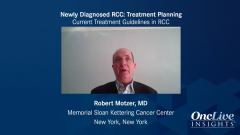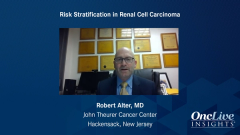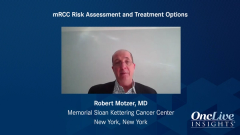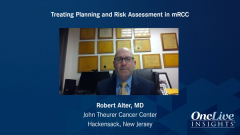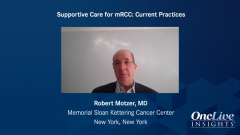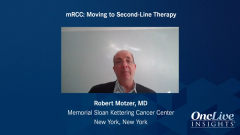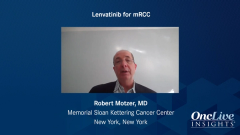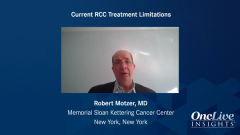
Lenvatinib for mRCC
Robert Motzer, MD, describes what lenvatinib is and explains the rationale for studying its use in combination with novel therapies such as everolimus as treatment for metastatic renal cell carcinoma.
Episodes in this series

Robert Motzer, MD: Lenvatinib is a highly potent VEGFR inhibitor. It hits multiple kinases. In addition to hitting a VEGF receptor, it also targets FGF. The fibroblast growth factor receptor was proposed as a kinase that is important in overcoming resistance to VEGF-targeted drugs, which we refer to as angiogenic escape. When lenvatinib was initially developed, there was interest and further study in this compound in patients who were more resistant or refractory to some of the other earlier TKIs [tyrosine kinase inhibitors] like sunitinib and pazopanib because of that mechanism of action.
There was interest in combining it with an mTOR inhibitor. It was largely based on preclinical data that suggested that when lenvatinib was combined with an mTOR inhibitor, the activity was enhanced. My colleagues and I designed a study that looked at lenvatinib and everolimus together in a phase I setting as a lead-in to define the dose in that setting. Then, we moved onto a randomized phase 2 trial where the combination of lenvatinib and everolimus was compared to the lenvatinib monotherapy and to everolimus. In the lead-in, we found that the recommended dose for lenvatinib/everolimus was 18 mg of lenvatinib a day and everolimus 5 mg a day.
The trial was then conducted, and there were about 150 patients accrued to that trial. We used everolimus as the control arm because, at the time, everolimus was the most commonly used second- or third-line therapy for this disease. In this trial, both lenvatinib/everolimus and lenvatinib had higher response rates and longer progression-free survival than everolimus. The magnitude was greater with the combination. Although there were some trade-offs, in terms of adverse events, the adverse effect profile of lenvatinib/everolimus was quite manageable. The main adverse effect that was observed was diarrhea.
One of the goals or one of the postulates for the lenvatinib story is that it is better to go in with a high dose and hit the tumor hard. If there then are adverse effects, back off with dose reductions. Most of the lenvatinib studies in RCC [renal cell carcinoma] have shown a fairly high rate of dose reduction, about 60%. The idea is to go in with a high dose for efficacy, and then if there are safety issues, back down on the dose. That was the idea behind that particular program. In an updated analysis, there appeared to be a survival benefit for lenvatinib/everolimus based on that small, randomized phase 2 trial.
The combination received regulatory approval based on the overwhelming efficacy that was seen in a randomized phase 2 trial. It is an important combination. Lenvatinib is a very potent, effective TKI. The addition of an mTOR brings in another mechanism of action, particularly in patients who have progressed on first-line TKIs. There is a sense of comfort for us when using the combination, not only with another TKI, but as well as a drug with different mechanism of action, like the approved drug everolimus. It is a highly effective combination that is approved for patients who have progressed previously on a TKI.
It was because of that efficacy and because it was approved on a relatively small phase 2 trial that the phase 3 followed. In the large phase 3 trial, the comparison was between lenvatinib/pembrolizumab to lenvatinib/everolimus, now in first line, to sunitinib. The results of that trial will be available shortly. There also looks to be a role for lenvatinib/everolimus now in the new era of IO [immunotherapy]. One of the concerns for patients who have progressed on first-line IO/TKI therapy combinations like axitinib/pembrolizumab is just giving them another TKI. How much better will the TKI be than the combination? There is a level of comfort with lenvatinib/everolimus bringing in the mTOR component. It is really a regimen that is defined on efficacy. I would see more use for that combination in the new era when the first-line paradigm has changed.
Transcript edited for clarity.



